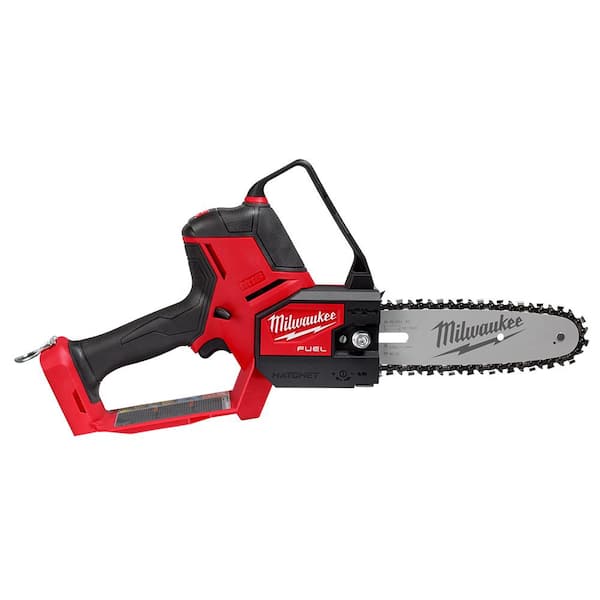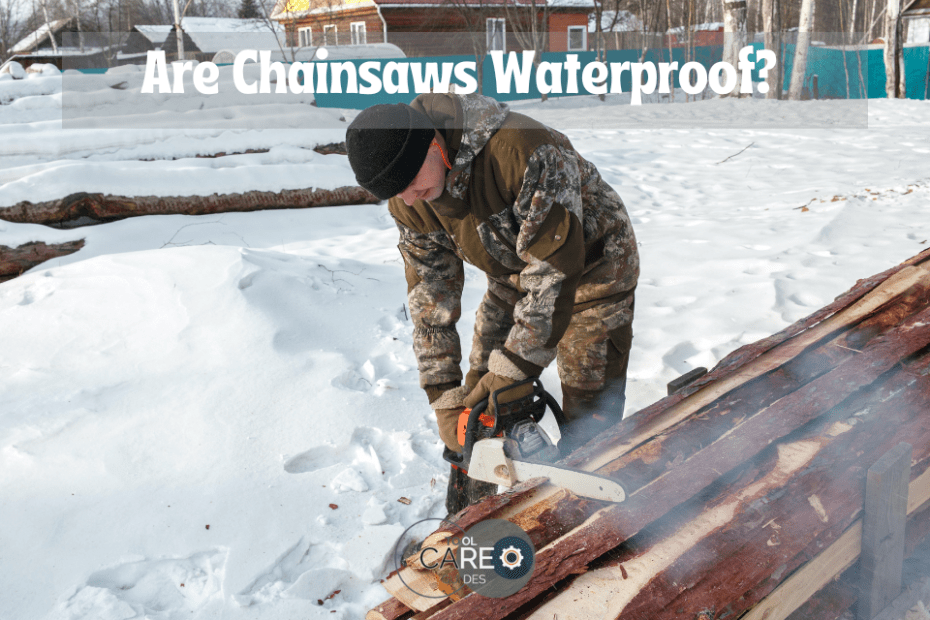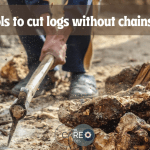Quick Overview of This Article
Petrol-powered chainsaws can be used in all types of weather, including rainy conditions. However, when using a chainsaw in wet conditions, the main concern is the slippery nature of sodden ground and wet wood, rather than the chainsaw itself.
Wet wood can be exceptionally slippery, making it more challenging to safely operate the chainsaw. Therefore, it is important to exercise caution and take necessary safety precautions when using a chainsaw in the rain.

Can A Chainsaw Be Used In The Rain?
Using a chainsaw in the rain is not recommended, as wet conditions can make the ground and wood slippery. However, petrol powered chainsaws can withstand various weather conditions.
When it comes to using a chainsaw in wet conditions, there are a few things to consider. Here is what you need to know:
- Water resistance vs. Waterproof: While chainsaws are not completely waterproof, some models are designed to be water-resistant. These chainsaws can withstand light rain or moisture without damage. However, it is important to note that they should not be submerged in water or exposed to heavy rain for extended periods.
- Safety precautions: Using a chainsaw in wet conditions can pose additional risks. Slippery surfaces and wet wood can make it harder to control the chainsaw, increasing the chances of accidents. It is crucial to wear appropriate safety gear, including non-slip boots and gloves, to maintain a firm grip and reduce the risk of injury.
- Maintenance: After using a chainsaw in the rain, it is essential to clean and dry it thoroughly. Moisture and water can cause rust and damage the internal components of the chainsaw. Regularly inspect the chainsaw for any signs of water damage, and store it in a dry place to prevent further issues.
- Waterproof accessories: Using a chainsaw bag or case can provide additional protection against moisture. These accessories are typically made from waterproof materials that shield the chainsaw from rain and other water sources.
- Check the manufacturer’s guidelines: Before using your chainsaw in wet conditions, always check the manufacturer’s guidelines. They will provide specific instructions on whether the chainsaw is suitable for use in the rain and any additional precautions you should take.
Remember that using a chainsaw in the rain can be risky, and it is important to prioritize safety. If the conditions are too wet or the rain is heavy, it is best to postpone using the chainsaw until the weather improves.
Can You Use An Gas Chainsaw In The Water?
Using a gas chainsaw in water is not recommended as chainsaws are not waterproof. While petrol-powered chainsaws can be used in various weather conditions, wet conditions can make the ground and wood slippery, posing a safety risk. It’s important to prioritize safety when operating a chainsaw.
Using a chainsaw in wet conditions can be risky, as water can damage the engine and affect its performance. When it comes to gas chainsaws, they are not designed to be used in water. Here are a few reasons why:
- Water and gas don’t mix: Gasoline is highly flammable, while water can extinguish fires. When a gas chainsaw comes into contact with water, it can cause the engine to stall or stop working altogether.
- Moisture damage: Water can seep into the various components of a chainsaw and cause corrosion. This can lead to long-term damage to the engine, spark plugs, and other parts, reducing the lifespan of the chainsaw.
- Safety hazards: Using a gas chainsaw in water can increase the risk of electric shocks and other accidents. Water conducts electricity, and the presence of water can increase the likelihood of accidents occurring.
Therefore, it is not recommended to use a gas chainsaw in the water. If you need to work in wet conditions, consider using alternative options such as electric chainsaws or specialized waterproof chainsaws for improved safety and performance.
Can You Use An Electric Chainsaw In The Rain?
Using an electric chainsaw in the rain is not recommended as electric chainsaws are not waterproof. Wet conditions can pose safety hazards and damage the chainsaw. It is best to avoid operating any chainsaw, electric or not, in rainy weather to ensure safety and prevent damage.
An electric chainsaw can be a powerful tool for cutting through branches and logs. But what happens when it starts to rain? Can you continue to use your electric chainsaw, or do you need to wait for the weather to clear up?
Let’s find out.
Here are some points to consider when using an electric chainsaw in the rain:
- Safety first: When working with power tools, safety should always be your top priority. Using an electric chainsaw in wet conditions can increase the risk of electrical shock. Therefore, it is not recommended to use an electric chainsaw in the rain to avoid any potential safety hazards.
- Water damage: Electric chainsaws are not designed to be waterproof. Exposing your electric chainsaw to rain can potentially damage the motor and other electrical components. Water can also cause rust and corrosion, compromising the overall performance and lifespan of the chainsaw.
- Maintenance: If your electric chainsaw gets wet during use, it’s essential to take immediate action to prevent any damage. After using the chainsaw in wet conditions, make sure to dry it thoroughly and lubricate the relevant parts to prevent rusting.
- Alternative options: If you need to perform cutting tasks in wet conditions, consider using a gas-powered chainsaw or a cordless chainsaw with a waterproof rating. Gas-powered chainsaws are generally more robust and can handle wet environments better than their electric counterparts.
- Protective gear: In case you find yourself needing to use an electric chainsaw in damp conditions, ensure that you are wearing appropriate protective gear, such as waterproof clothing, gloves, and safety goggles. This will help minimize the risk of injuries and keep you safe while working.
Remember, even though electric chainsaws are convenient and easy to use, it’s essential to prioritize safety and adhere to manufacturer guidelines. Using an electric chainsaw in the rain increases the risk of accidents and equipment damage, so it’s best to wait for dry conditions or consider alternative options.
Stay safe and make informed decisions when working with power tools.
Can I Use My Chainsaw After Rain?
Using a chainsaw in the rain is generally safe, as petrol-powered chainsaws can withstand wet conditions. However, it’s important to be cautious of slippery surfaces caused by sodden ground and wet wood.
When it comes to using your chainsaw after rain, it’s important to consider its waterproof capabilities. While chainsaws are not completely waterproof, they are designed to withstand light rain and damp conditions. Here’s what you need to know:
- Chainsaws are built with certain waterproof features that offer protection against moisture. These features include sealed ignition systems, waterproof switches, and coated or sealed components.
- Using a chainsaw in light rain or after rain should not cause any major damage to the tool, as long as it is properly maintained and dried off afterwards.
- However, it’s important to avoid using your chainsaw in heavy rain or submerging it in water, as this can lead to serious damage and pose safety risks.
- After using your chainsaw in wet conditions, make sure to clean and dry the tool thoroughly. Remove any dirt or debris and lubricate the chain to prevent rusting.
- Store your chainsaw in a dry and secure location when not in use, preferably in a waterproof case or bag to protect it from any potential moisture.
Remember, always prioritize your safety when using any power tool, including a chainsaw. Follow the manufacturer’s guidelines and exercise caution when operating the tool in wet conditions.
Are There Chainsaws That Work Underwater?
Using chainsaws underwater is not recommended, as they are not designed to work in such conditions. However, petrol-powered chainsaws can safely be used in rainy weather, as long as caution is taken to avoid slippery surfaces.
If you’ve ever wondered whether chainsaws are waterproof, you’re not alone. Many people wonder if they can use a chainsaw in wet or submerged conditions. In this section, we’ll explore whether there are chainsaws that work underwater.
Here are some important points to consider:
- Most traditional chainsaws are not designed to work underwater due to the risk of water damage to the engine and electrical components.
- Using a regular chainsaw underwater can potentially cause irreparable damage and void any warranty.
- However, there are specialized underwater chainsaws available for specific applications such as underwater cutting and diving operations.
- These underwater chainsaws are designed with special features like watertight seals, corrosion-resistant materials, and modified engines to withstand submersion.
- Underwater chainsaws are primarily used in industries like underwater construction, marine salvage, and emergency response.
- These chainsaws are typically powered by hydraulic systems or pneumatics since electricity and fuel-powered engines are not suitable for underwater use.
- Hydraulic chainsaws use hydraulic fluid to transfer power from the pump to the cutting chain, making them safe and efficient underwater.
- Pneumatic chainsaws, on the other hand, rely on compressed air to power the cutting chain and are also suitable for underwater operations.
- It’s important to note that while there are specialized chainsaws for underwater use, they are typically expensive and not commonly found in households or regular woodworking settings.
While there are chainsaws designed specifically for underwater use, most traditional chainsaws are not waterproof and should not be used underwater. If you require an underwater chainsaw, it is best to consult with professionals in the industry who specialize in underwater operations.
Remember to always prioritize safety and follow the manufacturer’s guidelines when operating any chainsaw, whether underwater or on land.
Hydraulic Chainsaw
Using a hydraulic chainsaw in wet conditions such as rain is generally safe, but caution must be taken due to the potential hazards of slippery ground and wet wood. The chainsaw itself is not affected by water, but the user must exercise caution to ensure safety.
- Hydraulic chainsaws are designed to be used underwater, making them waterproof.
- These chainsaws are powered by hydraulic pressure, which allows them to work effectively in wet conditions.
- The hydraulic system in these chainsaws eliminates the need for an electric or gas-powered engine, making them safe to use in water.
- The waterproof feature of hydraulic chainsaws makes them ideal for cutting trees or debris that are submerged in water.
- These chainsaws are commonly used by divers, rescue teams, and underwater construction workers for their waterproof capabilities.
Benefits Of Using A Hydraulic Chainsaw:
- Versatility: Hydraulic chainsaws can be used for a variety of underwater cutting tasks, such as removing fallen trees or clearing debris.
- Safety: Since hydraulic chainsaws do not rely on electricity or gas, there is minimal risk of electrical shock or fuel leakage in water.
- Efficiency: The hydraulic system provides consistent power, ensuring smooth cutting performance even in wet conditions.
- Durability: Hydraulic chainsaws are built to withstand the harsh conditions underwater, including corrosion-resistant materials that prevent damage.
- Precision: The compact design and lightweight nature of hydraulic chainsaws allow for precise cutting in tight spaces.
Remember, when using a hydraulic chainsaw underwater, always follow safety guidelines and use appropriate protective gear.
Pneumatic Chainsaw
Using a chainsaw in the rain is generally safe, as long as it is petrol-powered. The main concern is the slippery conditions caused by wet wood and sodden ground. However, be cautious and take necessary safety measures when using any chainsaw in wet weather.
A pneumatic chainsaw is a type of chainsaw that is powered by compressed air. Unlike traditional chainsaws that are powered by gas or electricity, pneumatic chainsaws rely on the pressure of compressed air to drive the cutting chain.
Advantages:
- Lightweight: S are lighter than their gas or electric counterparts, making them easier to handle and maneuver.
- Safer: Since pneumatic chainsaws don’t have a fuel source, there is no risk of fuel leaks or combustion, making them a safer option.
- Suitable for underwater use: Pneumatic chainsaws can be used underwater, making them ideal for tasks such as underwater logging or cutting through ice.
Disadvantages:
- Limited mobility: Pneumatic chainsaws require a source of compressed air, which means they are generally tethered to an air hose. This limits their mobility and makes them less convenient for certain tasks.
- Requires additional equipment: In order to use a pneumatic chainsaw, you will need an air compressor to provide the necessary compressed air. This adds an additional cost and equipment requirement.
- Noise level: Pneumatic chainsaws can be louder than other types of chainsaws due to the noise generated by the air compressor.
Pneumatic chainsaws have their advantages and disadvantages. They are lightweight, safe, and can be used underwater, but they have limited mobility and require additional equipment. Depending on your specific needs and circumstances, a pneumatic chainsaw may be a suitable option for you.
Can You Use A Chainsaw In The Snow?
Yes, you can use a chainsaw in the snow, but it’s important to note that chainsaws are not waterproof. While they can withstand light moisture, excessive exposure to water can cause damage to the tool and compromise its functionality. It’s always best to exercise caution and avoid using a chainsaw in wet or snowy conditions if possible.
Using a chainsaw in snowy conditions can be a necessity for certain outdoor tasks. Here are a few points to consider when using a chainsaw in the snow:
- Snow can affect the chainsaw’s performance due to conditions such as wetness and temperature. It is crucial to ensure the chainsaw is suitable for operating in cold weather.
- When using a chainsaw in the snow, it is important to take extra safety precautions. Cold temperatures can affect your grip and can potentially make the chainsaw more difficult to handle.
- Lubrication is essential when operating a chainsaw in snow. Cold temperatures can cause the oil to thicken, so using a winter-grade oil will help maintain proper lubrication and prevent damage to the chainsaw components.
- It is advisable to clear the snow around the area you are working in to prevent slipping or tripping on any obstructions on the ground.
- Proper clothing, including thermal gloves, waterproof boots, and warm layers, is crucial when using a chainsaw in snowy conditions. These clothing items will help keep you warm and protected.
Remember, always prioritize safety when using a chainsaw, especially in challenging weather conditions like snow. By taking the necessary precautions and following the manufacturer’s guidelines, you can safely and efficiently use a chainsaw in the snow.
What’s The Best Chainsaw For Cold Weather?
Chainsaws themselves are not waterproof, but petrol-powered chainsaws can be used in rainy weather. However, it’s important to note that wet conditions can make the ground and wood slippery, so caution should be taken when using a chainsaw in the rain.
When it comes to using a chainsaw in cold weather, it’s important to choose a model that can withstand the low temperatures and still perform optimally. Below are some factors to consider when looking for the best chainsaw for cold weather:
- Engine type: Gas-powered chainsaws tend to perform better in cold weather than electric models. The internal combustion engines of gas chainsaws are designed to operate in various weather conditions, including low temperatures.
- Cold-start technology: Look for chainsaws that have features specifically designed for cold weather starting, such as a decompression valve or a winter/summer switch. These features make it easier to start the chainsaw in cold temperatures.
- Anti-freeze measures: Some chainsaws have special anti-freeze measures in place to prevent the fuel lines from freezing. This can be particularly important in extremely cold climates.
- Fuel mixture: If you’re using a gas-powered chainsaw, make sure to use the correct fuel mixture recommended by the manufacturer for cold weather conditions. Using the wrong fuel mixture can affect the performance of the chainsaw.
- Bar and chain oil: In cold weather, it’s essential to use a bar and chain oil that is designed to work in low temperatures. This type of oil has a lower viscosity, ensuring that it flows smoothly and lubricates the chainsaw parts effectively.
- Insulated handles: Look for chainsaws with insulated handles or grip wraps. These can help prevent your hands from getting too cold and making it difficult to operate the chainsaw.
- Cold weather accessories: Consider purchasing accessories like a cold weather cover or a heated handle grip to further protect yourself from the cold weather while operating the chainsaw.
When looking for the best chainsaw for cold weather, consider factors such as the engine type, cold-start technology, anti-freeze measures, fuel mixture, bar and chain oil, insulated handles, and cold weather accessories. By choosing a chainsaw that is specifically designed for cold weather conditions, you can ensure that your chainsaw performs well and is reliable even in freezing temperatures.
Safety Precautions When Using A Chainsaw In A Wet Environment
Using a chainsaw in wet conditions can be risky due to slippery surfaces. While chainsaws themselves may not be waterproof, petrol-powered chainsaws can be used in rainy weather. However, caution should be taken to ensure safety when operating the chainsaw in a wet environment.
It’s important to prioritize safety when using a chainsaw in a wet environment. Here are some precautions to keep in mind:
- Always wear appropriate protective gear, including a helmet, eye protection, ear defenders, gloves, and non-slip boots.
- Ensure that the chainsaw is in good working condition before using it in wet conditions.
- Check the chain tension and sharpness to prevent accidents.
- Use a chainsaw with an anti-kickback chain and a chain brake for added safety.
- Be aware of your surroundings and avoid slippery surfaces that may increase the risk of accidents.
- Maintain a firm grip on the chainsaw with both hands to have better control.
- Keep the chainsaw away from water sources, including puddles and bodies of water.
- Avoid operating the chainsaw in heavy rain or during thunderstorms due to the increased risk of electrical hazards.
- Take frequent breaks to reduce fatigue and maintain focus while using the chainsaw.
- Follow the manufacturer’s instructions and guidelines for using the chainsaw in wet conditions.
Remember, safety should always be the top priority when using a chainsaw, especially in wet environments. By following these precautions, you can minimize the risks and work more confidently. Stay safe!
Frequently Asked Questions
Is It Safe To Use A Chainsaw In The Rain?
Using a chainsaw in the rain is safe. The main concern in wet conditions is slippery ground and wet wood.
Can You Leave A Chainsaw Outside?
Yes, it is safe to leave a chainsaw outside, but keep in mind that exposure to weather elements can damage the chainsaw over time.
Can Stihl Chainsaws Get Wet?
Stihl chainsaws can be used in wet conditions, but be cautious of slippery surfaces like wet wood.
Can I Use Battery-Powered Chainsaw In The Rain?
It is safe to use a petrol-powered chainsaw in the rain as long as you are cautious of slippery conditions. Wet wood and sodden ground can be hazardous.
Conclusion
Using a chainsaw in the rain can be safe, especially if you have a petrol-powered chainsaw. Rain or shine, these chainsaws are designed to work in all types of weather conditions. However, it’s important to remember that the main concern when using a chainsaw in wet conditions is the slippery ground and wet wood.
Both can pose a safety risk, as they can make it difficult to maintain stability and control while operating the chainsaw. That’s why it’s crucial to exercise caution and take appropriate safety measures when using a chainsaw in rainy weather.
So, while chainsaws themselves are not necessarily waterproof, they can still be used effectively in wet conditions with the proper precautions in place. Just remember to prioritize safety and always follow best practices when operating a chainsaw.




